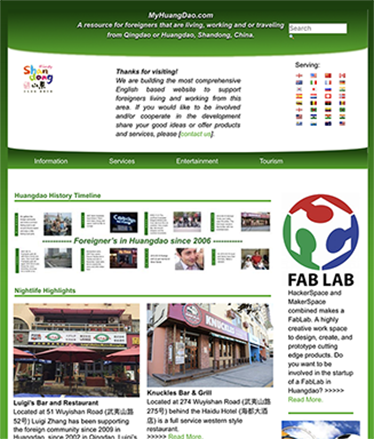Below is a list of FDI investment reports from various countries China Investment and Trade Organizations starting with Canadian resources and ends with China government investment and statistics sites:
Canada Offices in Qingdao
Government of Canada Trade Commission Services
Qingdao Shangri-la Centre Office Tower No. 9 Xiang Gang Zhong Road, Room 2608, 26th Floor, Qingdao 266071 Website: https://www.canadainternational.gc.ca/china-chine/ Manager: Peter Hu Mobile: 186 6393 8266 Email: peter.hu@internationalccc.ca
Quebec Trade Office Qingdao
Shangri-La Centre, 9 Hong Kong Middle Road District of Shinan, Qingdao Tél. : +86 532 6695 0965 qc.qingdao@mri.gouv.qc.ca Manager: (new one being appointed)
Canada China Business Council [https://ccbc.com/]
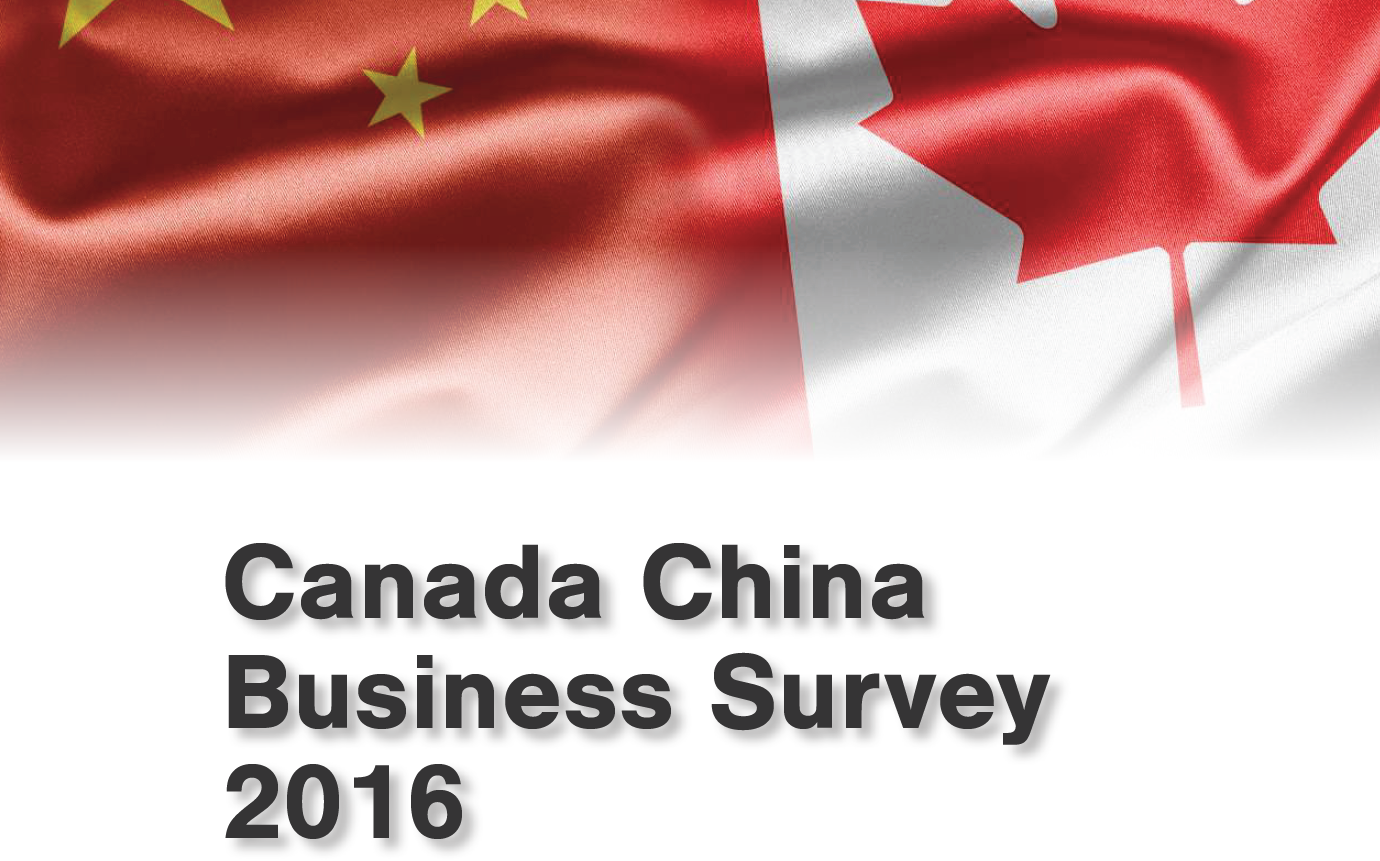
[https://www.ccbc.com/wp-content/uploads/2017/05/CCBC-Survey-Report-FINAL_EN_sm.pdf]
China has emerged as Canada’s second-largest trading partner and is an increasingly important source and destination for Canadian foreign direct investment. Nevertheless, this bilateral relationship is underdeveloped and there remain significant opportunities and obstacles to further growth in the bilateral relationship. To shed light on these issues, including opportunities and challenges, and also to develop recommendations for both business and government, the Canada China Business Council, in partnership with the Rotman School of Management, surveyed a broad cross section of Canadian companies doing or considering doing business in China, as well as Chinese companies doing or considering doing business in Canada. The survey was conducted during the latter half of 2016, and the results are compared to survey results in 2014 and earlier. 205 responses were received. The report provides analysis and perspective of the survey responses as well as recommendations. This is the first year that Chinese companies were included in the survey, and while the sample size is small, the results help us see the perspective from both sides.
[https://chinainstitute.ualberta.ca/] The China-Canada Investment Tracker project is part of the China Institute’s mission to advance the study of the economic and political dimensions of contemporary China through policy-relevant research. Our ongoing activities in this area include the Annual National Forum on Chinese Investment in Canada, the China Institute’s flagship event that brings together China scholars, policy-makers, industry leaders, and others to highlight and discuss recent investment trends and policy perspectives.
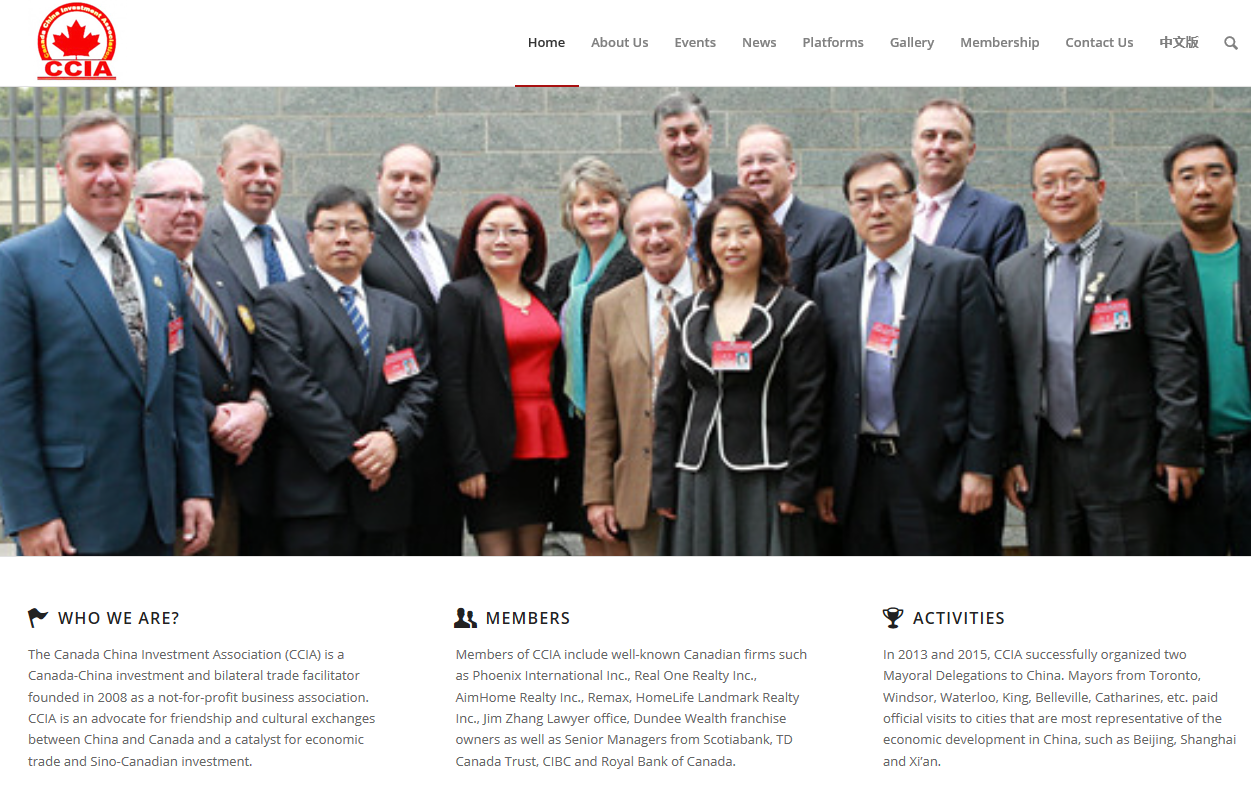
[http://cciacanada.com/] The Canada China Investment Association (CCIA) is a Canada-China investment and bilateral trade facilitator founded in 2008 as a not-for-profit business association. CCIA is an advocate for friendship and cultural exchanges between China and Canada and a catalyst for economic trade and Sino-Canadian investment.
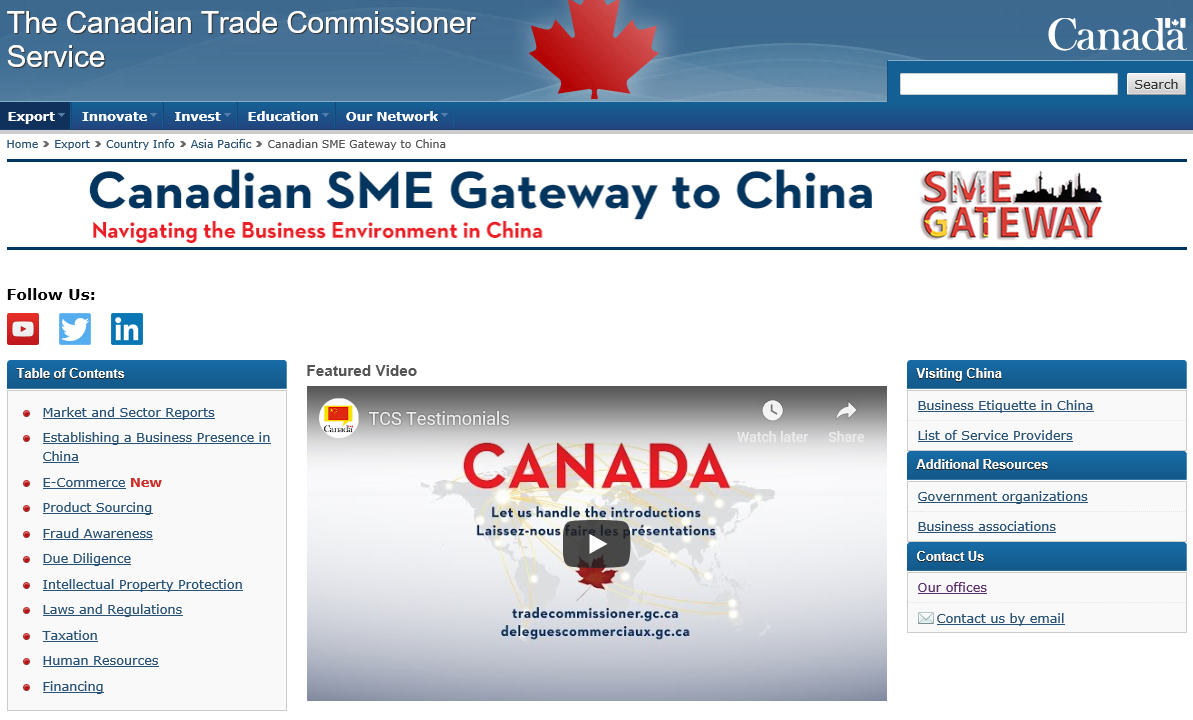
[https://www.tradecommissioner.gc.ca/world-monde/sme_gateway_china-portail-pme-chine.aspx?lang=eng]
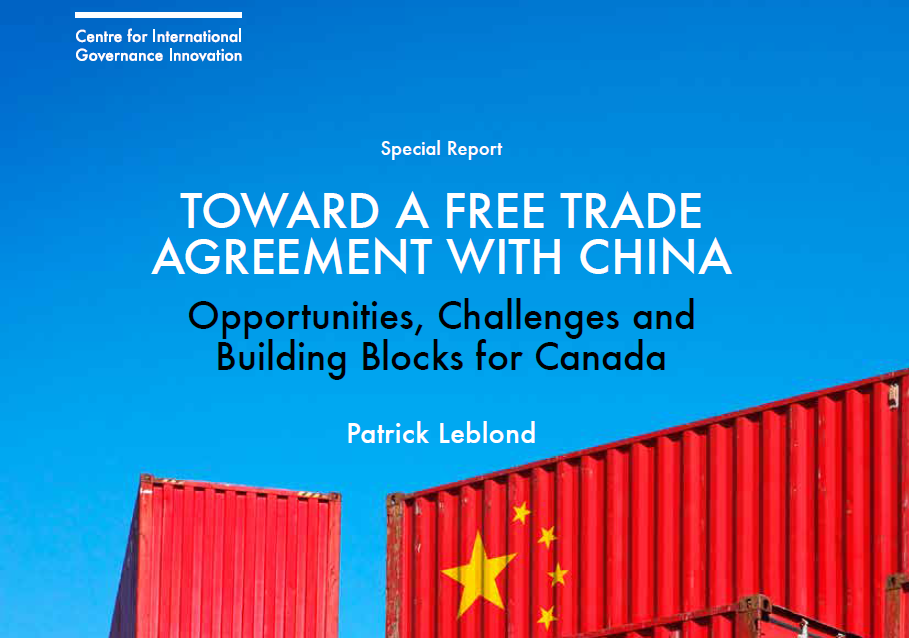
A possible free trade agreement (FTA) with China represents a great opportunity for Canada, since it would give the latter preferential access to the world’s third-largest economy after the European Union and the United States. It would also help level the playing field for Canadian businesses vis-à-vis their Australian, New Zealand and Swiss competitors, which operate under FTAs that their countries have signed with China.
[https://www.cigionline.org/sites/default/files/documents/China%20Canada%20Trade.pdf]
[https://www.asiapacific.ca/sites/default/files/filefield/canada-china_fta_report_final_1.pdf]
Fraser Institute FTA Update [https://www.fraserinstitute.org/sites/default/files/toward-free-trade-in-canada-five-things-federal-government-can-do-update.pdf]
Business Council of Canada [https://thebusinesscouncil.ca/]
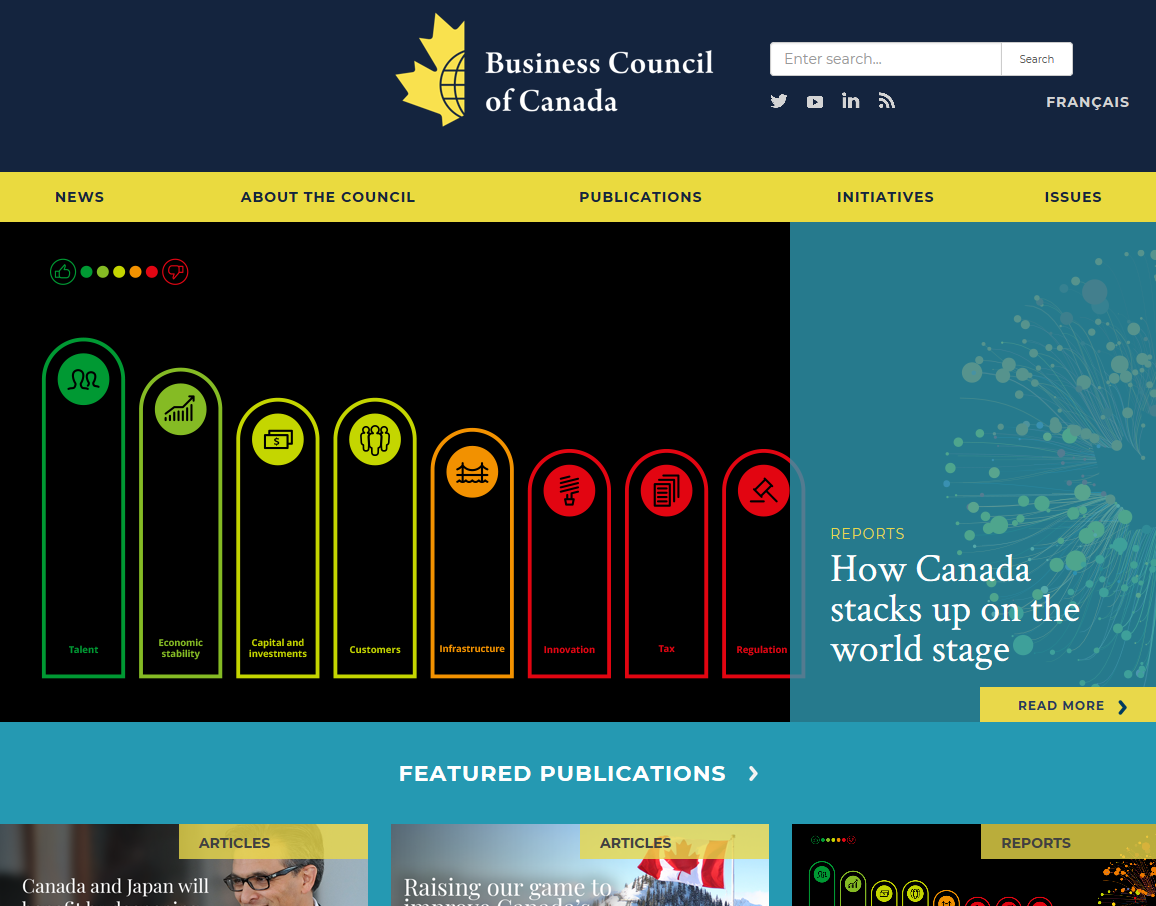

[https://thebusinesscouncil.ca/wp-content/uploads/2019/03/18-6115T-BCC-Scorecard-InteractivePDF-V14-ENGLISH.pdf] This Competitiveness Scorecard, completed by Deloitte Canada, analyzes more than 500 data series across a dozen key global competitor nations and summarizes Canada’s performance in eight key areas: talent, economic stability, capital and investments, customers, infrastructure, innovation, tax and regulation.
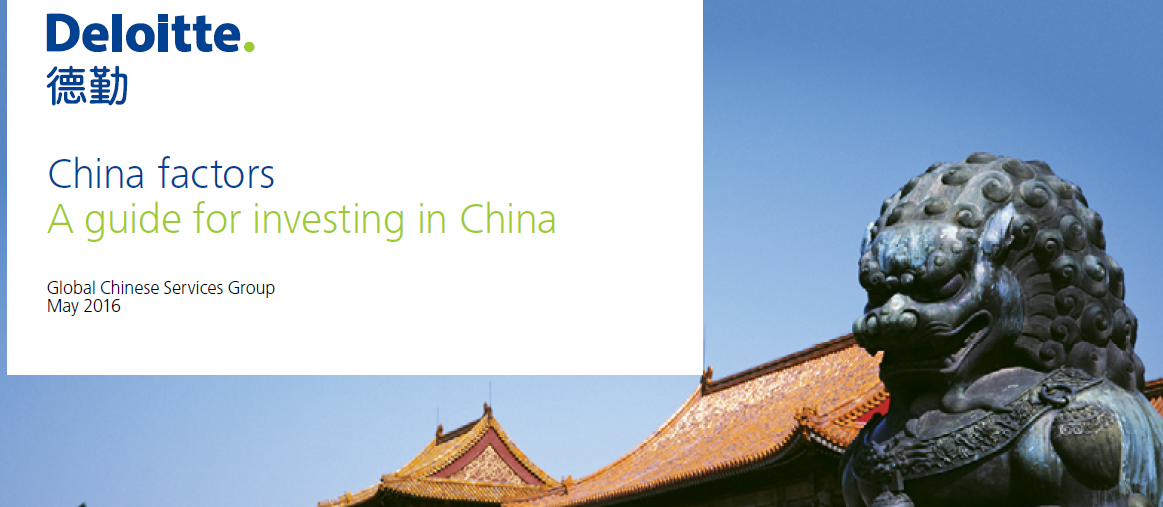
The government kept the economy growing by injecting RMB4 trillion (US$586 billion) to support SOEs. Central government policy, funding, tax, and innovation efforts have consistently emphasized one goal: to develop a more advanced and technology driven economy. Emerging industries such as Internet, Smart Manufacturing, Electric Vehicle and Healthcare will become the backbone of China’s next phase of industrial modernization and technological development. These industries could drive China’s broader growth as an internationally competitive economy. In the past five months, profit growth from emerging industries was 20 percent, with an annual income of more than RMB5 million, much higher than the average national level. Thus, emerging industries should become increasingly important in boosting the economic growth of the country.
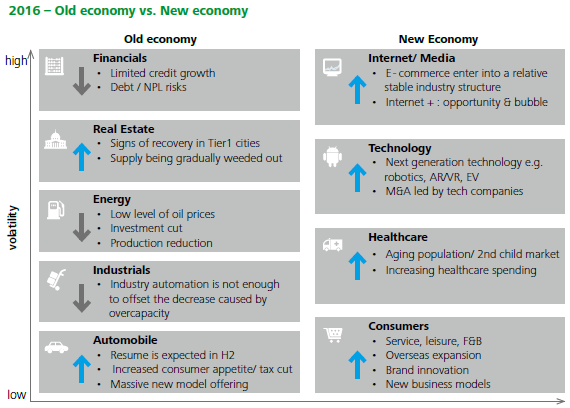
Smart Manufacturing the next wave: The industry output value of China's smart manufacturing was about RMB1 trillion in 2015 and is expected to exceed RMB3 trillion by 2020, with an average annual growth of 25 percent in the coming five years. Deloitte China surveyed over 200 manufacturing companies in various sectors in 2013 and 2015, respectively. The survey results indicate that China's smart manufacturing market is entering an era of rapid growth.
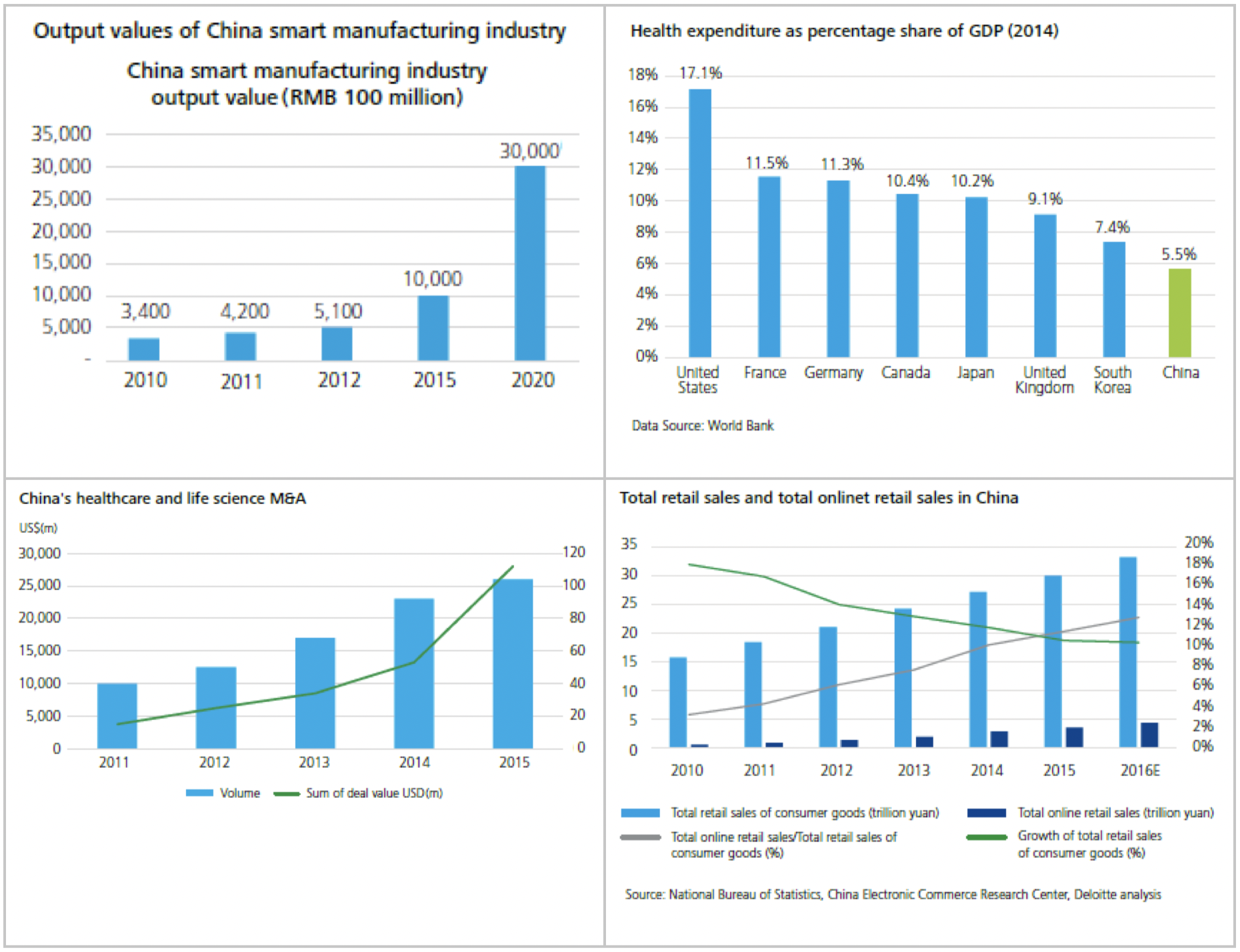
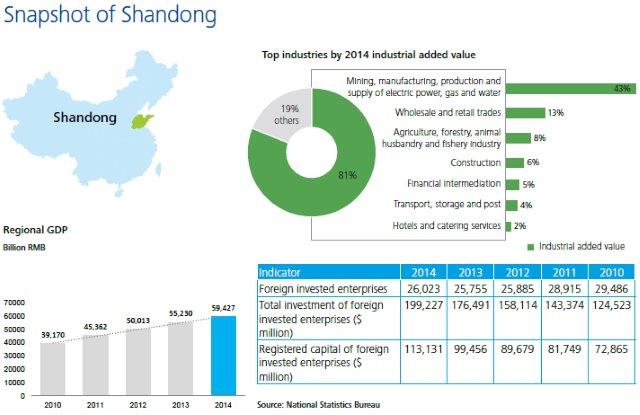
United States China Business Council [https://www.uschina.org/]

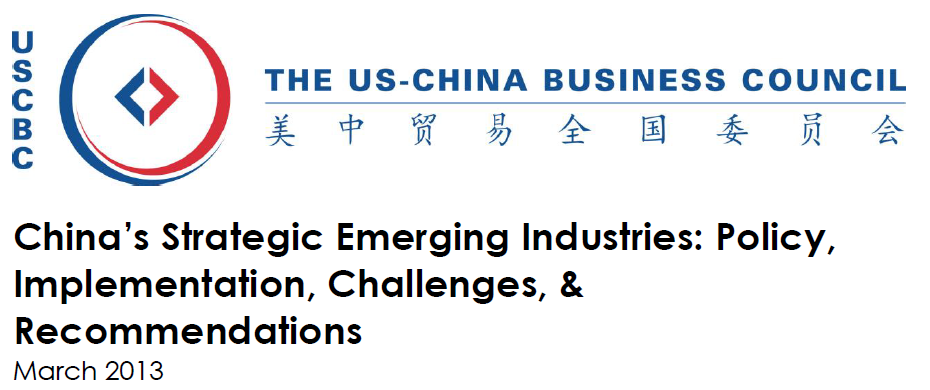
[https://www.uschina.org/sites/default/files/sei-report.pdf] (PDF - 524 KB)
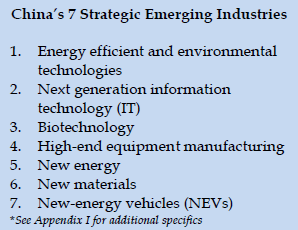
Foreign companies have increasingly sought to understand how their business might align with market opportunities presented within the sectors slated for special government attention. However, companies have faced significant challenges in finding reliable information on SEI policies and implementation. This is often due to the opaque manner in which policies are being developed and the lack of explanations for how policies relate to each other.
China-Britain Business Council [http://www.cbbc.org/]

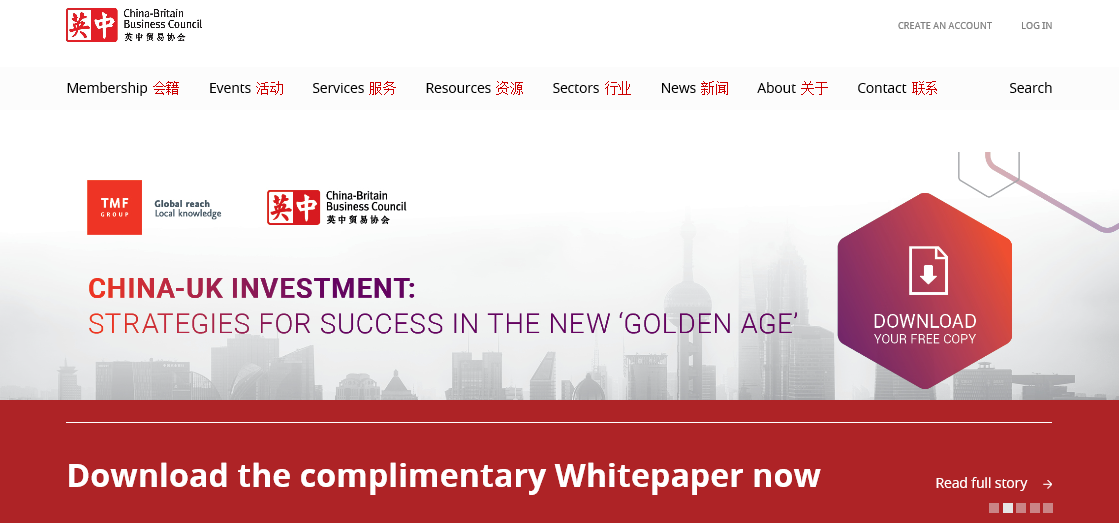
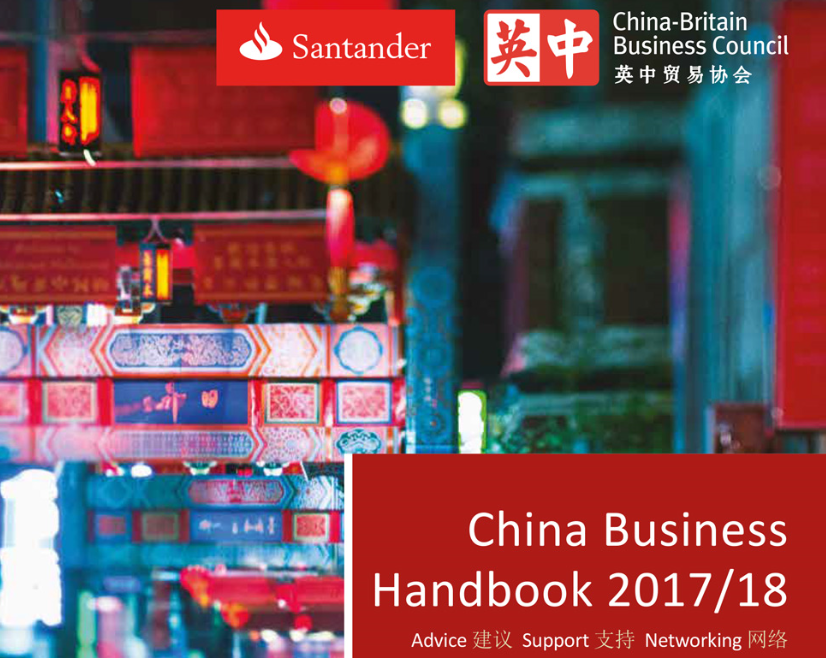
[http://handbook.cbbc.org/handbook#chinabusinesshandbook201718/cover]
Australian China Business Council [http://acbc.com.au/]

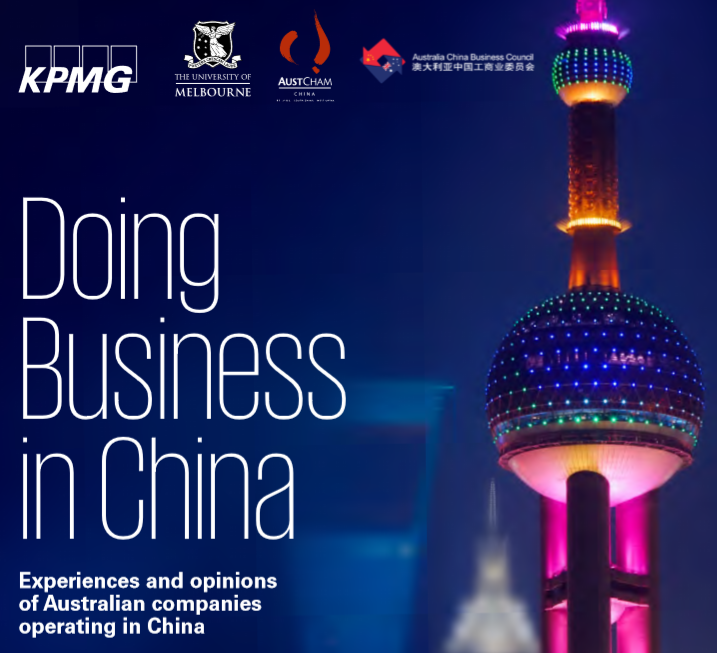
[https://assets.kpmg/content/dam/kpmg/au/pdf/2018/doing-business-in-china-november-2018.pdf]
Both believe the best intelligence about the Chinese economy comes from the people on the ground. That’s why the 2018 Doing business in China report is so important. It surveys 165 AustCham and ACBC members who are working every day to grow their businesses in and with China, and who know first‑hand the challenges and opportunities in the world’s biggest developing economy. This report examines the intentions and attitudes of those in the best position to gauge the real life impacts of shifts in the Australia‑China relationship.
Overall, the 2018 survey results are consistent with 2017 in describing a business environment in China which is challenging for Australian companies, but affords ample opportunities. While the predominant strategy is expansionary and the attitude continues to be upbeat, a fast evolving market‑place has ensured that there have been significant shifts in the nature of the challenges, opportunities, concerns and risks faced by businesses operating in China. From a business perspective, China’s Belt and Road Initiative remains an important opportunity. Notably, the survey highlights the importance for companies of Sino‑Australian bilateral relations as well as the impact of media reporting of those relations and the collateral effects of Sino‑US trade disputes.

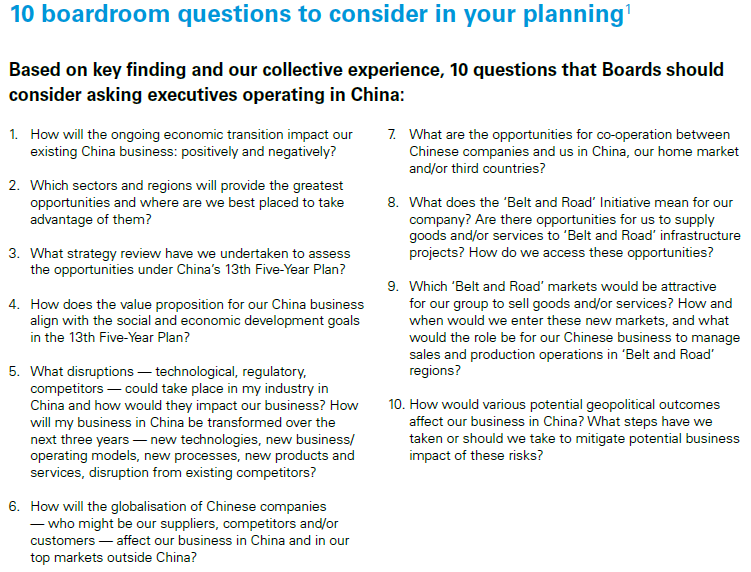
United Nations Conference on Trade & Development (UNCTAD)

[https://unctad.org/en/Pages/publications.aspx] Global flows of foreign direct investment fell by 23 per cent in 2017. Cross-border investment in developed and transition economies dropped sharply, while growth was near zero in developing economies. With only a very modest recovery predicted for 2018, this negative trend is a long-term concern for policymakers worldwide, especially for developing countries, where international investment is indispensable for sustainable industrial development. This troubling global investment picture underscores the importance of a conducive global investment environment, characterized by open, transparent and non-discriminatory investment policies. The theme chapter of the report shows that over 100 countries have adopted industrial development strategies in recent years. New types of industrial policies have emerged, responding to the opportunities and challenges associated with a new industrial revolution. The report presents options for investment policy tools in this new environment.

[https://unctad.org/en/PublicationsLibrary/tdr2018overview_en.pdf] Technological changes are having a profound impact on the way we go about our daily lives. Digital innovations have already changed the way we earn, learn, shop and play. Collectively, as a fourth industrial revolution, they are changing the geography of production and the contours of work. But in the end, social and political actions – in the form of rules, norms and policies – will determine how the future unfolds. In this respect, the digital revolution has the misfortune of unfolding in a neo-liberal era. Over the last four decades, a mixture of financial chicanery, unrestrained corporate power and economic austerity has shredded the social contract that emerged after the Second World War and replaced it with a different set of rules, norms and policies, at the national, regional and international levels. This has enabled capital – whether tangible or intangible, long-term or short-term, industrial or financial – to escape from regulatory oversight, expand into new areas of profit-making and restrict the influence of policymakers over how business is done.




Modern Industrial Policies promoting Entrepreneurship, Innovation, Sustainable development (SDG), Knowledge and Learning Economy, Technical Development Institutes, Global Value Chain (SVC) development, New Industrial Revolution (NIR) development.
Investment policies (in particular FDI policies) have always been a key instrument of industrial policies. Different industrial policy models carry different investment policy prescriptions. New themes in modern industrial policies need to be reflected in investment policies. The NIR, especially, requires a strategic review of investment policies for industrial development.
Santander Trade-Portal [https://en.portal.santandertrade.com/establish-overseas/china/foreign-investment#why]

What to consider if you invest in China
Santander points for FDI in China: The largest internal market in the world, with 1.3 billion potential customers Importance of foreign currency reserves and public debt owned by Chinese government and individuals A well-developed production sector (manufacturing sector and heavy industry) A favourable geographic location (close to emerging Asian markets, to Japan, maritime frontage) Top economy in terms of purchasing power parity (PPP) thanks to rapid growth of the economy Labour costs remain comparatively low, although the situation is changing in certain areas New opportunities with the development of the western provinces (particularly Sichuan province) Development of a new export network (Silk Road network)
Disadvantages for FDI in China: An ever-changing legal environment Bureaucratic and administrative complexities A lack of transparency, corruption and weak intellectual property rights protection Ageing population High level of corporate indebtedness Production overcapacity in several sectors A strongly degraded environmental situation in several big cities Cultural differences in business practises that may be difficult for foreigners to learn and apply in new business situations Underdeveloped middle management and low rate of qualified workers Government Measures to Motivate or Restrict FDI
Generally speaking, the Chinese government is more restrictive than other big economies in regard to foreign investment, with numerous sectors closed to FDI. State companies and "national flagships" are protected (discriminatory practises, non-independent judicial power, selective application of regulations). The Chinese state demands forced technology transfer and its intellectual property protection system is weaker than most industrialised countries.
The Chinese government encourages investment in the following industries or sectors: high technology, production of equipment or new materials, service sector, recycling, use of renewable energies and protection of the environment. In addition, the country appears to discourage foreign investment in key sectors, for which China seeks to transform domestic firms into globally competitive multinational corporations and sectors that have historically benefited from state monopolies or traditionally of State. The government also discourages investments intended to profit from speculation (money, real estate, or assets). In addition, the government plans to limit foreign investment in resource-intensive and highly polluting industries.
The Chinese Government unveiled an Index of foreign investment orientation in industries in June 2017. It aims to liberalise investments in several sectors. China continues to target foreign investment in high-end industries, technology, environmental protection and advanced services. The service sector in the broad sense will be fairly broadly open to FDI.
From [https://en.portal.santandertrade.com/establish-overseas/china/foreign-investment]
[https://openknowledge.worldbank.org/bitstream/handle/10986/24720/HealthReformInChina.pdf]

During the last three decades, there has been a momentous social transformation in China, with 600 million people pulled out of poverty. At the same time, China has made impressive strides in health. Since the launch of a new round of reforms in 2009, China has invested substantially in expanding health infrastructure, achieved nearly universal health insurance coverage, promoted more equal access to public health services, and established a national essential medicine system. These measures have significantly improved the accessibility of health services, greatly reduced child and maternal mortality, incidence of infectious disease, and considerably improved health outcomes and life expectancy of the Chinese population.
Average life expectancy of the Chinese people reached 76.34 years in 2015, 1.51 years longer than in 2010. China’s overall health level has reached the average of middle- and high income countries, achieving better health outcomes with less input. These achievements have been well recognized internationally. China has now reached a turning point. It is starting to face many of the same challenges and pressures that high-income countries face.
Chinese over the age of 65 now number 140 million, and that cohort is expected to grow to 230 million by 2030. High-risk behaviors like smoking, sedentary lifestyles and alcohol consumption, as well as environmental factors such as air pollution, take a huge toll on health, and non-communicable diseases account for more than 80 percent of 10.3 million deaths every year. At the same time, with higher economic growth, increased personal incomes, and fast changes in consumption patterns, people are demanding more and better health care. As a result of all these factors, expenditures on health care have been increasing continuously. China is facing greater challenge as the high growth rates of health expenditure in the past years may be difficult to sustain under the economic slow-down.

In 2015, three economies in China participated in the OECD Programme for International Student Assessment, or PISA, for the first time: Beijing, a municipality, Jiangsu, a province on the eastern coast of the country, and Guangdong, a southern coastal province. Shanghai, which, like Beijing, is also a Chinese megacity of over 20 million people, has participated in PISA since 2009. These four economies alone are home to more than 233 million people – more than the entire population of Brazil, nearly three times the population of Germany and nearly four times the population of France.
[http://www.oecd.org/china/Education-in-China-a-snapshot.pdf]
[https://www.china-briefing.com/]


[https://www.chinabusinessreview.com/the-changing-landscape-of-chinas-manufacturing-sector/]
[http://www.fdi.gov.cn/1800000121_10000041_8.html]


[http://www.fdi.gov.cn/1800000121_41_93_0_7.html] English [http://www.fdi.gov.cn/1800000121_10000033_8.html] Chinese

Invest in China: Ministry of Commerce People's Republic of China From [http://www.fdi.gov.cn/1800000121_41_43_0_7.html]

[http://english.mofcom.gov.cn/statistic/charts.shtml]





